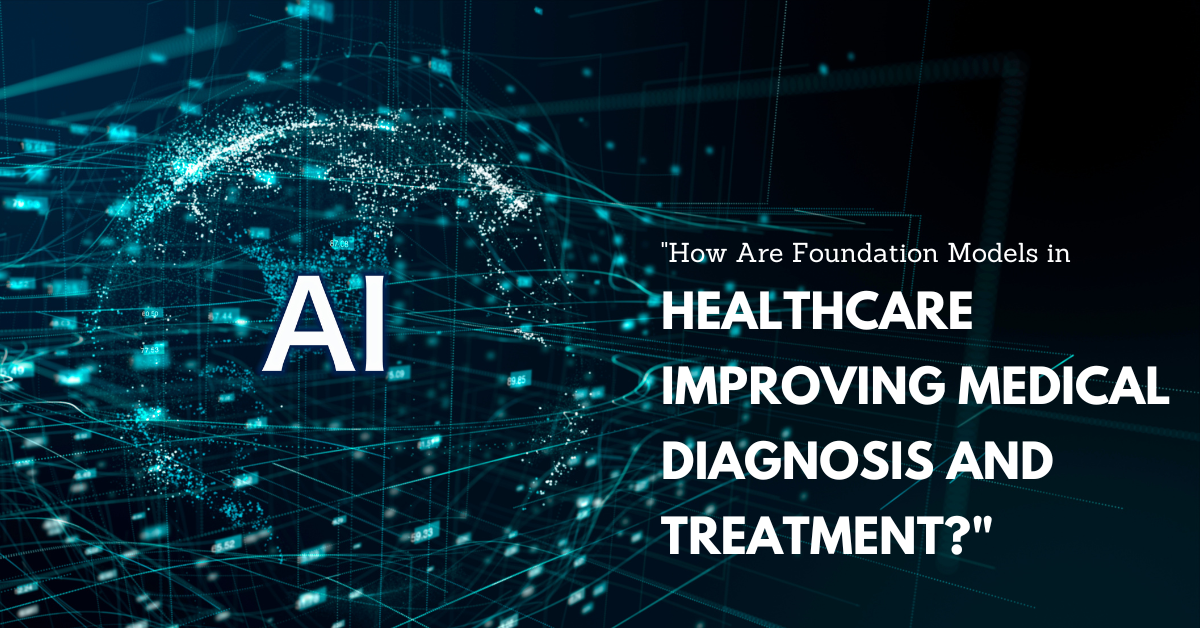 ChatGPT
ChatGPT
 Grok
Grok
 Perplexity AI
Perplexity AI

4 min read | By Postpublisher P | 11 September 2023 | Artificial Intelligence
Imagine that you’re having a device that reminds you to take medications on time. What if it gives you clear medical information like blood sugar level, insulin level, depression insights etc. Cool, right? Would you mind if we say the foundation model can make this possible.
Foundation models are generative AI models designed to handle a wide range of tasks like text, audio, and image generation. These systems can operate independently or serve as a fundamental building block for many different applications.
We’ll explore more about the foundation models and their contribution to healthcare in improving medical diagnosis and treatment. You may wonder on reading this how foundation models are making the medical field better.
Foundation models like chatGPT, Bloom, GPT-3.5 are smart computer tools. Everyone knows these AI tools are really smart and can talk like people. In healthcare, these AI tools play a vital role. They assist doctors in finding out what’s going on with patients.
As they are pre-trained on massive amounts of text, images, and data, they can look at lots of medical information. They assist doctors in diagnosing patients and predicting future health issues. Other foundation models like IBM Watson and Google BERT contribute to the betterment of the healthcare sector.
Watson helps doctors by searching through a lot of medical info to find the right answers. BERT on the other hand, helps understand medical language better. It makes it easier to find the correct health information online. So people can trust what they read when they’re looking for it.
Foundation models are super good at analyzing medical images. They can understand pictures of X-rays and scans. It makes them spot diseases or injuries, faster and more accurately than humans.
Foundation models change the way of analyzing medical images with increased accuracy. They can predict your health issues with precision, especially in the fields of radiology and pathology. They help doctors find tumors early and quickly analyze X-rays.
In certain cases, doctors can’t figure out where the cancer originated. This makes it hard to pick the right treatment. Because most cancer drugs are made for certain types of cancer. Foundation Models use their algorithms to look into the medical tests, reports, and scans. When they analyze all this data, they can locate where those cancer cells might have originated.

Early detection can save lives. It’s much easier to treat and increases the chances of a full recovery too. Foundation Models alert you of health problems so you can take action sooner. They are trained to detect multiple medical conditions like diabetes, high blood pressure, high cholesterol, and sleep apnea.
For example, Cardiogram’s DeepHeart uses deep learning techniques to analyze information from wearable devices, like smartwatches. They can help in early detection and monitoring of various health conditions.
Telemedicine makes use of various technological tools that deliver care to patients. It is useful in managing diseases that require frequent monitoring. Patients can have video calls with their doctors from home using platforms like Zoom or telemedicine apps (Lemonaid Telemedicine App, Teladoc Health App). These apps help patients remember to take their medications on time.
Smart insulin pens are innovative devices designed to assist diabetic patients in managing their insulin levels effectively. They are equipped with sensors to collect data on insulin injections, such as the time, dosage, and frequency. They have advanced features like smartphones and Bluetooth integration.
Physicians use generative AI, including GPT-3.5 to help write concise clinical notes. They are integrated into chatbots designed specifically for healthcare applications. These chatbots engage in conversations with patients. They give information, answer questions, and help with healthcare inquiries.
For example, Doctor.ai uses GPT-3.5 to understand questions in English and provide relevant answers. This enhances the efficiency of maintaining patient information and improves the quality of medical records.
Using foundation models in healthcare has its negative impacts. They learn everything from the data they are trained on. So, there are some possibilities of giving biased results. This can lead to unequal treatment among different patient groups.
This limitation stops foundation models from reaching the people who need them the most. Foundation models must keep learning new things. But it’s a great challenge to keep them updated and accurate.
So yeah, foundation models are making notable improvements in healthcare. They improve diagnoses and suggest customized treatments. Telemedicine makes it easy for everyone to meet the doctor, no matter where they are.
Challenges like data biases and limited access remind us of the barriers to clear. Yet, future research can focus on addressing these limitations. So, no more nail biting in the hospital waiting room, thinking if you’ll get the right diagnosis.
Join over 150,000+ subscribers who get our best digital insights, strategies and tips delivered straight to their inbox.